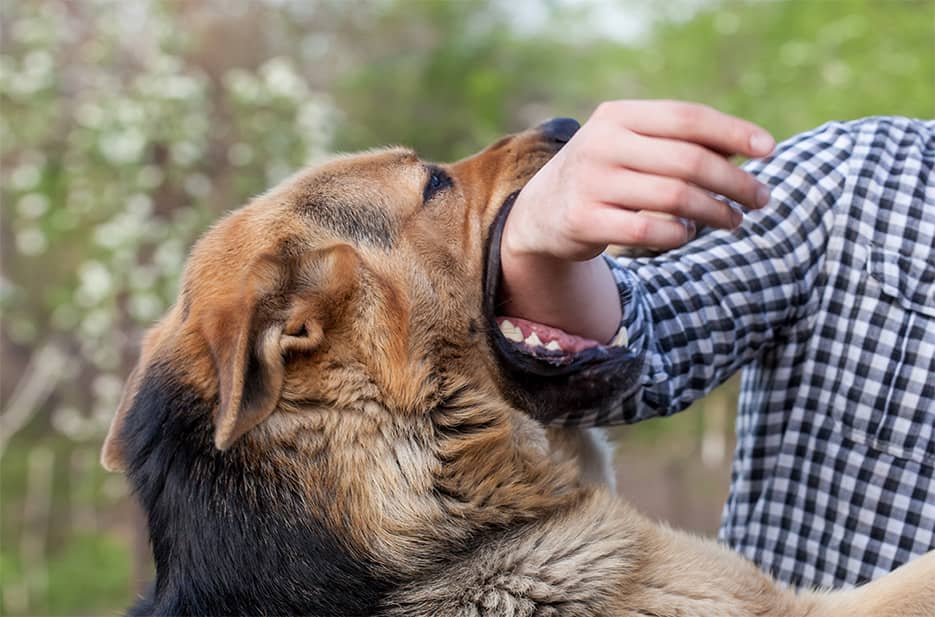Can I Sue if a Dog Bites Me on Private Property in California?

If you’ve been bitten by a dog while on private property in California, you may be wondering about your legal options. Can you sue the dog’s owner for your injuries and other damages?
The answer is generally yes, but there are some important factors to understand.
California’s Strict Liability Dog Bite Law
California has what’s known as a “strict liability” dog bite statute (California Civil Code Section 3342). Under this law, a dog owner is liable for damages if:
- The damages were caused by a dog bite, and
- The person bitten was in a public place or lawfully in a private place.
This means that the dog owner is responsible for the injured person’s damages, regardless of whether the owner knew the dog would act aggressively or whether the owner took precautions to restrain the dog.
The rationale behind this law is that dog owners should be responsible for ensuring their dogs do not harm others. Even if an owner had no reason to believe their dog would bite, the law holds them accountable. This contrasts with some other states that follow a “one bite rule,” where owners are only liable if they knew or should have known their dog was dangerous.
When Are You “Lawfully” on Private Property?
The key question when the bite occurs on private property is whether you were there “lawfully.” You are considered lawfully on private property if:
- You are on the property in the performance of a legal duty (like a mail carrier)
- You are on the property upon the invitation, express or implied, of the owner
So if you were invited onto the property, either directly by the owner or implicitly (like a party guest), and then bitten, the owner would likely be liable under California law.
This invitation doesn’t have to be explicit. For example, if a homeowner has a “Beware of Dog” sign but also a sign welcoming girl scouts to come to the door to sell cookies, a girl scout bitten while selling cookies could argue she was lawfully on the property under an implied invitation.
However, if you were on private property without permission, like a burglar, you would not be considered “lawfully” there and the owner would not be liable under the dog bite statute (though you might face other legal issues!).
Exceptions to the Rule
There are a few exceptions to California’s strict liability dog bite rule:
- Trespassers: If the victim was not lawfully on private property (e.g., a trespasser), the owner is not liable under the dog bite statute. However, the owner could potentially face liability under other legal theories if the dog was unreasonably dangerous and the owner failed to take reasonable precautions.
- Police/Military Dogs: If the dog was assisting military or law enforcement personnel in the execution of official duties, the agency is immune from liability under the dog bite statute. However, liability may attach if the agency had prior knowledge that the dog was vicious and failed to take reasonable precautions.
- Provocation: If the dog was protecting its owner or another person from an attack, or was defending property against a criminal act, the owner may not be liable. Similarly, if the victim provoked the dog into attacking, this could provide a defense for the owner.
What Damages Can You Recover?
If you have a valid claim under California’s dog bite law, you can recover damages for:
- Medical expenses, including future anticipated expenses
- Lost wages and loss of earning capacity
- Pain and suffering, including emotional distress
- Property damage (like torn clothing)
- Punitive damages (in rare cases of egregious owner conduct)
The specific amount will depend on the severity of your injuries and your individual circumstances. Factors like the extent of your medical treatment, the length of your recovery, any permanent scarring or disfigurement, and the impact on your ability to work and enjoy life will all play a role in determining your damages.
It’s important to keep detailed records of all expenses and losses related to the bite. This includes medical bills, receipts for medications or medical equipment, proof of missed work and lost wages, and any other documentation of your damages.
Statute of Limitations
It’s critical to note that California has a statute of limitations for personal injury claims, including dog bites. You typically have two years from the date of the bite to file a lawsuit but the deadline can vary, for instance, for minors or persons with certain disabilities. If you miss this deadline, the court will likely dismiss your case, barring exceptional circumstances.
This may seem like plenty of time, but it’s best not to delay. Gathering evidence, obtaining medical records, and building a strong case can take time. Plus, the longer you wait, the harder it may be to locate witnesses and prove your damages. If you’ve been bitten, it’s advisable to speak with an attorney as soon as possible to protect your rights.
To Sue or Not to Sue? Contact LA Dog Bite Law Now.
If you’ve been bitten by a dog on private property in California, and you were lawfully on that property, you likely have a right to recover damages from the dog’s owner. California’s strict liability statute holds owners responsible even if they had no reason to believe their dog was dangerous.
However, dog bite cases can be difficult, with issues of provocation, trespassing, and other defenses potentially coming into play. An experienced personal injury attorney at LA Dog Bite Law can evaluate your case, help you build the strongest claim possible, and fight for the compensation you deserve.
Remember, this blog post is for general informational purposes only and is not a substitute for personalized legal advice. If you’ve been bitten, consult with our qualified attorneys about your specific situation.